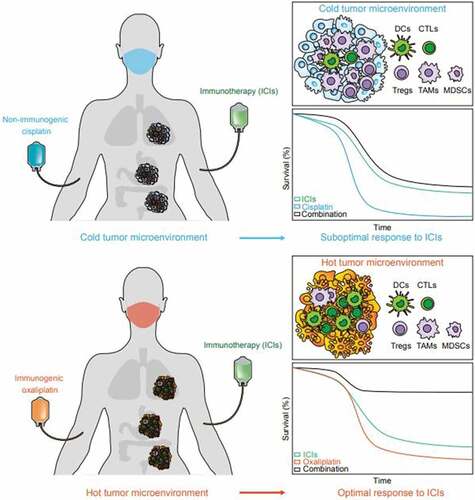Figures & data
Table 1. Preclinical studies combining ICD inducers and PD-1/PD-L1 blockade.
Figure 1. Synergistic effect of immunogenic chemotherapies and immune checkpoint inhibitors. Cisplatin (CDDP) is a non-immunogenic cell death (ICD)-inducing chemotherapeutic that fails to prime adaptive immunity in tumors, forming a “cold” immune microenvironment that consists more immune suppressive cells like tumor-associated macrophages (TAMs), myeloid-derived suppressor cells (MDCSs), and regulatory T cells (Tregs), but less antigen presenting cells such as dendritic cells (DCs) or effector cells such as cytotoxic T lymphocytes (CTLs). Thus, CDDP cannot synergize with PD-1 targeting immune checkpoint inhibitors (ICIs). Oxaliplatin (OXA) induces ICD and establishes a primed “hot” tumor immune microenvironment that favors the infiltration and accumulation of DCs and CTLs over immunosuppressive cells, thus sensitizing to the immunotherapeutic effects of PD-1 targeting antibodies.

Table 2. Results from the Keynote-062 study and the Checkmate 649 study.
Table 3. List of ongoing clinical trials that evaluate the combination of PD-1/PD-L1 blockade with either cisplatin or oxaliplatin in gastric cancer.
Data availability statement
All data sources that have been referenced.
